Mar 31, 2015
Topics
Embassy of Japan in Indonesia Selects Panasonic's Power Supply Container
Osaka, Japan - It was announced today that the Project to Improve Elementary Education and Alleviate Poverty by Providing Electricity to Banjarsari Village, Pangalengan Sub-District, Bandung District, West Jawa Province, for which the stand-alone Power Supply Container developed by Panasonic will act as a power source, has been selected by the Embassy of Japan in Indonesia as a joint public/private sector project utilizing Grant Assistance for Grass-roots Human Security Projects.(*1)
The Power Supply Containers are stand-alone photovoltaice power packages developed for the many electricity-less areas in developing countries. They contain solar cells, (*2) lead storage batteries (*3) and also the newly developed Power Supply Control Unit that acts as the energy management system.
This project has supplied a Power Supply Container to the National Elementary School Malabar 04 under the educational environment improvement policy for mountainous areas. The NGO FEDUs, located in Bekasi, Indonesia, is undertaking and providing support for this project to deliver the Power Supply Containers.
Banjarsari Village is situated in an area where electricity is available via a power company, but as the school is located in a tea plantation, it has been without power for 32 years. The school was thus unable to provide a sufficient educational environment utilizing IT, such as ordinary computers.
Panasonic will deliver a Power Supply Container to the National Elementary School Malabar 04, creating a better institutional and educational environment through providing power for school electrical equipment like lights and pumps as well as educational tools like computers, projectors, televisions and so on. Work is ongoing towards introduction of the containers in July 2015.
The Power Supply Container is equipped with twelve Panasonic HIT(TM) solar modules which have a high conversion efficiency and can generate approximately 3 kW of electricity. It is also equipped with 24 lead-acid storage batteries (17.2 kWh as total) which can supply stored power. This project will supply power to the electrical equipment in the school and classrooms during school time, while the excess energy generated out of school hours will be supplied to the local community, helping to stabilize the local power supply.
Panasonic aims to use the Power Supply Container as a solution for areas in Indonesia where the power infrastructure is an issue, such as areas without electricity or places facing frequent power blackouts, and envisions realization ofa more enriched and pleasant lifestyle.
The Power Supply Container will in the future be supplied to other Asian countries and emerging nations to bring electricity to every corner of the globe.
*1: Joint public/private sector projects using Grant Assistance for Grass-roots Human Security Projects: the provision of financial assistance in the form of ODA to relatively small-scale projects run locally by local public bodies, educational/medical institutions, NGOs and so on in developing nations. Ministry of Foreign Affairs of Japan provides support for corporate social responsibility of Japanese corporations to develop regional economies and socioeconomic infrastructure in countries undertaking such projects, particularly for cases run jointly by the public and private sectors.
*2: Panasonic monocrystalline hybrid solar cell modules "HIT"
*3: Panasonic deep cycle valve-regulated lead-acid batteries
* HIT is a trademark of the Panasonic Group.
Features of the Power Supply Container
The mass production oriented design of container was developed in order to realize an assured level of quality. The Indonesian manufacturer,PT. Panasonic Gobel ES Manufacturing Indonesia handles the quality control, bringing Japanese knowhow of quality control technology into Indonesia. The company is aiming to further lower the price of the containers in the future through moving to mass production.
The container is designed so that no onsite professional construction work is needed, allowing an electrical contractor to easily and quickly install the Power Supply Container, helping to spread the adoption of the systemin the smaller islands of Indonesia. In addition, as the system is in the form of a container, it can be easily moved from where it is installed to another area without electricity. Also, by increasing the load-bearing apparatus, additional containers can also be added to further expand their functions.
The container uses Panasonic HIT(R) solar modules to provide power efficiently, even in a restricted space. The company's newly developed Power Supply Control Unit acts as the energy management system to monitor the remaining electricity level of the lead-acid batteries and controls supply and demand, heavily reducing deterioration of the batteries. This reduces the life-cycle cost and maintenance man-hours for the storage batteries.
Specifications
| Name | Power Supply Container stand-alone photovoltaic power package |
|---|---|
| Container | Container for marine transportation |
| Dimensions (mm) | 4780 (W) x 3452 (L) x 3486 (H) (Container: 3029 (W) x 2438 (L) x 2591 (H)) |
| Mass | Approx. 3000 kg |
| Maximum inverter output | 3 kW |
| Total storage capacity | 17.2 kWh |
| Solar modules | Monocrystalline hybrid solar module "HIT" x 12 |
| Control board | Power Supply Control Unit |
| Storage batteries | 12V/60Ah Deep cycle valve-regulated lead-acid battery x 24 |
Related Links
-
The Power Supply Container at a local primary school
-
The Power Supply Container at a local primary school
-
The Power Supply Container
The content in this website is accurate at the time of publication but may be subject to change without notice.
Please note therefore that these documents may not always contain the most up-to-date information.
Please note that German, Spanish and Chinese versions are machine translations, so the quality and accuracy may vary.

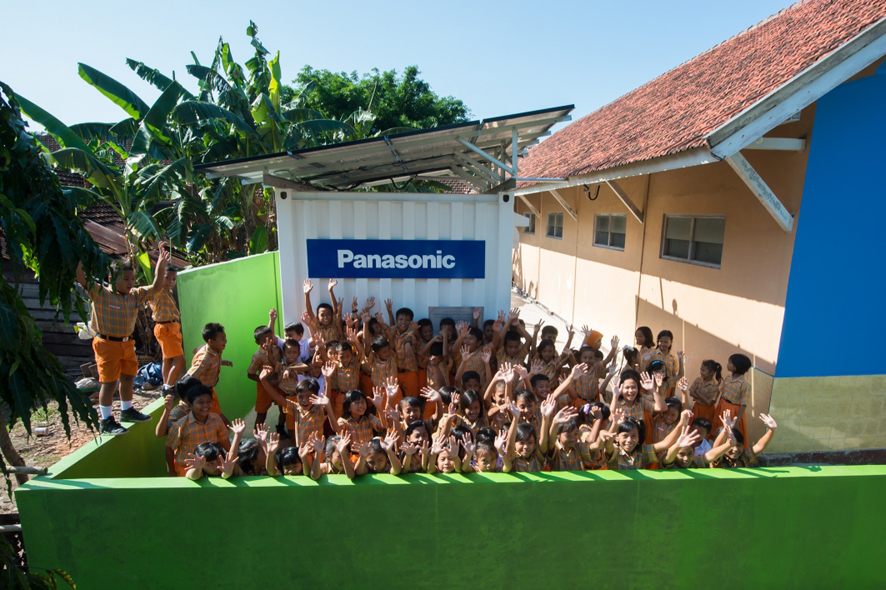
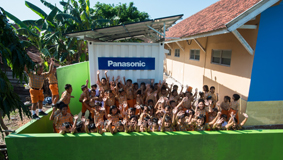
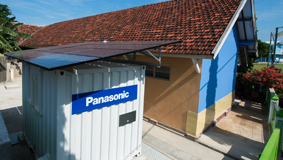
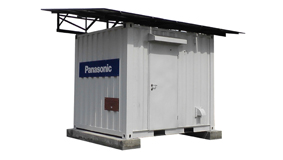
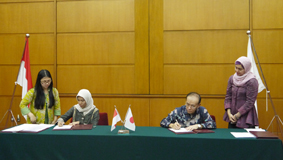
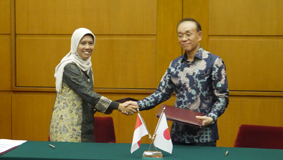




![[Video] TOYOTA ARENA TOKYO is born! Where next-gen sports experiences happen](http://news.panasonic.com/uploads/tmg_block_page/cover_image/18092/tat-main.jpg)
